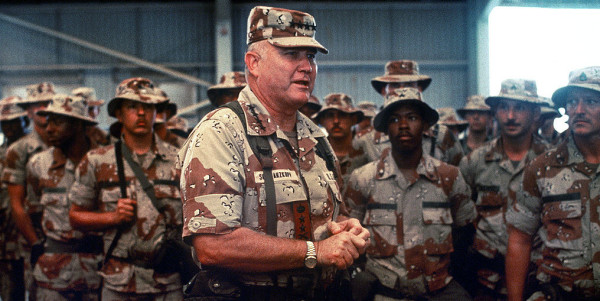

Editor’s Note: The following is an excerpt from “With Schwarzkopf: Life Lessons of the Bear,” a book by Gus Lee published by Smithsonian Books in October 2015.
We were talking about what cadets discussed—sports and girls—without the normal other topics of movies, cars, and complaints about academics, demerits, bad weather, and restrictive Academy life. Some prayed, others drank, few slept enough, no one used drugs, there was no online pornography, football players got knee surgeries like the rest of us took aspirin, and our penal colony members walked punishment tours on the Area. Major Schwarzkopf and I discussed history. It was Christmas, I was sentimental, and felt the Bear was like family; I wanted to talk about Christmas and hope. I started to speak.
“Did you know,” he said, “that Hannibal, much more than Caesar, Adolphus, and Napoleon, uniquely showed us, the United States Army, at Cannae how to fight modern war?” In 216 B.C. at Cannae on the Italian peninsula, Hannibal the Carthaginian enveloped and destroyed a superior Roman army in a stunning execution of the military art. For 22 centuries, soldiers and would-be generals had studied it.
“Sir, I didn’t know that.”
“Gus, what was the key to America’s success in World War II?”
I thought: so many choices. We were truly unique in industrial strength. We beat the world with it. “Industrial capacity. We were the ‘Arsenal of Democracy.’”
“Wrong! It was leadership, which produced our Allied coalition. Without our Allies, all the industrial capacity in the world wouldn’t have mattered. First principle: It’s always about leadership, and always will be. Without it, we’d have lost. What was our Allied coalition premised on?”
“Mutual need, sir.”
“No. It was premised on leadership’s ability to respect all persons. No respect, no leadership. No leadership, no allies. Our respecting England, Canada, Scotland, Wales, and the Commonwealth states, and the Chinese, French, and Poles produced reliable allies, without which we couldn’t have landed at Normandy and gone on to defeat Hitler. George C. Marshall knew that back in 1919, that’d we need a coalition of democratic states to defeat Germany in a second world war. Most people thought he was nuts: They thought there’d be no need for coalitions because Germany would never rise from the ashes of defeat, and there wouldn’t be any more wars. Of course, he was right and they were unbelievably wrong.
“Hannibal taught Marshall that lesson at Cannae, and he’s still teaching it to us today. Without a unified coalition of free peoples, we can’t beat the great tyrannical states. Hannibal won with a free army of Iberians, North Africans, Gauls, Celts, Italianates, and Africans.”
“Even though,” I said slowly, “tyrannical states, like the USSR, raise bigger armies.”
“Right. Tyrants like Hitler and Stalin create empires and build slave armies that can overwhelm the smaller forces that the democracies can muster, just like Darius and Cyrus and the Ottomans. That’s why democracies must band together. They have to do it in peacetime to practice together so the tyrants know it’d be suicidal to take on the coalition of the democracies. And if they do cross the border, then the coalition can whip them. It’s the Tolkien myths: elves, dwarves, trees, and men overcoming their individual weaknesses to produce synergistic strength against evil tyrants.”
“Sir, you read Tolkien?”
“Stay on course. Listen, Carthage was a center of world trade, putting Hannibal in an ideal nexus to form relationships with foreign tribes to resist Rome. The U.S. economy is the center of world trade and we’re riding a decade-long economic boom in jobs and income. Everyone needs our high-quality steel, cars, planes, and manufactured goods. We’re the Carthage and Rome of this century. And all we have to do is . . .”
“Build coalitions like NATO and SEATO.”
“That’s right. Democracies need reliable friends and then practice at war so hard, so strenuously, that no one would dare fight us or our independently sufficient allies.”
I said quietly, “Like we should do in Vietnam.”
“Like I hope we’re starting to do in Vietnam,” he said.
“Sir, we study engineering instead of how to make coalitions.” I beamed at him. “I rest my case that West Point ought to let us have non-engineering majors.”
He shook his head. “Be realistic. West Point’s not going to change its engineering essence anytime soon, or ever. We’re talking coalitions as key to the military art; stay in this lane. You can study that without making Sylvanus Thayer, the father of the Military Academy, rotate in his grave. Here’s the irony: We study Cannae for Hannibal’s maneuver decisions when we should be learning how Hannibal formed a winning coalition of very diverse peoples. With the end of colonialism, that’s now of premium import. We should be studying him more and Napoleon less.”
I rubbed my face, a nervous gesture when my brain was about to explode. “Agreed, sir.”
“What does this have to do with you, right now?” he asked.
“I should be forming a coalition of reliable, democratic friends.”
“What does that mean in real terms?”
“No Republicans, sir?” I made a Gallic, Maurice Chevalier smile, the smug and humorous boulevardier who knew the world.
“Very funny, but no cigar,” he said without humor. “Drop and give me 50 pushups. Stop, I was just kidding. Gus, you need to pick friends who’ll make you a better man. Not just guys to pal around and play cards and do RF’s in barracks.”
Excerpted with permission from With Schwarzkopf: Life Lessons of the Bear. Available from Smithsonian Books. Copyright 2015.
